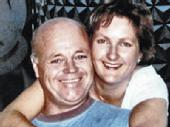
THE widow of an ex-Navy radio operator who died of abestos-related cancer is backing a campaign to raise awareness of the "cruel" disease.
Yvonne Bunton, aged 46, has spoken of her husband Tony's tragic death and said "unjust" laws prevented them from suing for compensation.
She is supporting a campaign launched last week, which aims to highlight a growing number of asbestos victims in Plymouth and the South West.
The city has been highlighted as a hotspot for the lung cancer mesothelioma, which can affect former dockyard workers as well as other tradesmen.
Yvonne said: "I couldn't have asked for a better husband, we were soul mates. He was wonderful and he was taken from me too early.
"It's a shocking, cruel disease. Once it gets hold of you, that's your death warrant. We didn't know what was hitting us."
Tony Bunton, aged 61, of Lanreath near Looe, died of mesothelioma on Christmas Eve, 2009 after the shock diagnosis just months before.
He had been exposed to asbestos dust during warship refits at Devonport Dockyard during his time in the Navy from ages 15 to 26, said Yvonne.
She said he used to watch while civilian tradesman stripped the substance from pipes on HMS Cavalier and HMS Hermes.
"He used to have to sit on guard duty while the civilian men were delagging," she said. "The Navy staff would clean up afterwards, and obviously breathe in the dust as they swept it up. They didn't have any protection."
She added that Tony later worked as a carpenter, but was building new houses in which asbestos was not used.
A keen footballer and referee with local clubs, he was diagnosed with mesothelioma in May last year after noticing he was slightly out of breath on the pitch.
At the time he was working at Looe Community School as a work-related learning coordinator.
Yvonne said: "He was a really fit and active guy, which made it such a shock.
"He was so brave, he never let it get to him even though he knew he was dying. But I felt shattered because I knew I was going to lose him."
He underwent chemotherapy and radiotherapy but the cancer spread through both lungs.
He died on Christmas Eve at their Lanreath home. Yvonne said Derriford Hospital and the Macmillan nurses had offered "brilliant" support throughout his illness.
Yvonne said: "The worst thing about this disease is when the sufferers are getting poorly and they can't breathe. The anxiety they go through because they can't get a breath is awful and distressing to see."
She said she and Tony were unable to sue the Ministry of Defence, as civilians who worked in the dockyards can, due to the Crown Proceedings Act 1987 which bars servicemen from seeking compensation from the MoD through the courts.
Whereas civilians can receive pay outs well in excess of £100,000, ex servicemen can make a claim under the War Pensions or Armed Forces Compensation Schemes.
Yvonne said: "I've always said that I don't want compensation, I want my husband. And I don't begrudge those families who receive the compensation. It's wonderful for them.
"But the government is unfair. It's unjust that people like Tony who served their country are not compensated the same as civilians. A widow's war pension is a pittance compared to the sums paid out to others."
Anyone who has suffered illness as a result of their service in the Armed Forces is entitled to make a claim under the War Pensions or Armed Forces Compensation Schemes. The MoD says war pensions equate to compensation received by civilians.
Led by city law firm Bond Pearce, the mesothelioma campaign is the latest to highlight issues surrounding asbestos-related diseases.